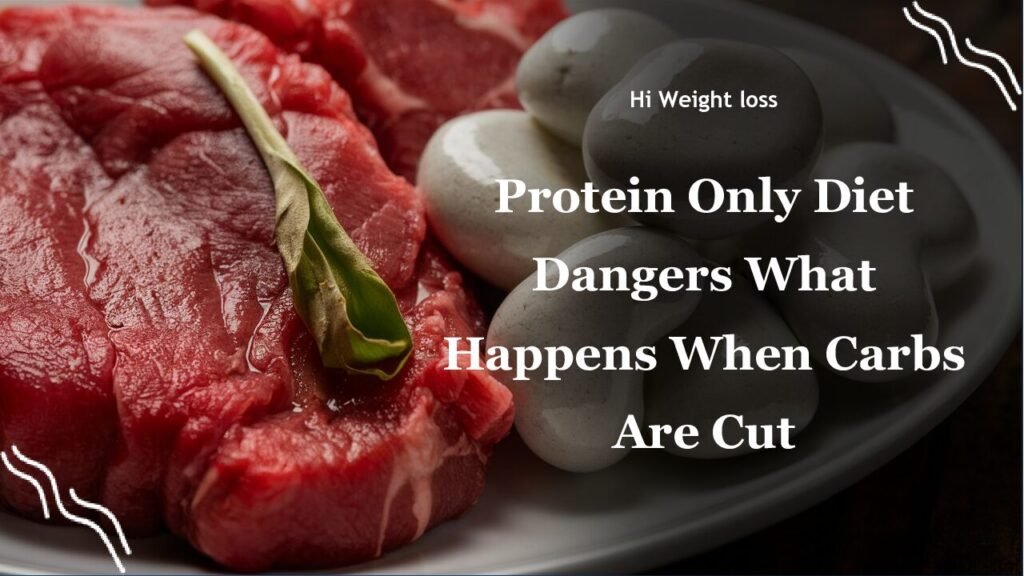“`
Have you ever considered drastically cutting carbs and going all-in on protein, hoping for quick health improvements? It’s a tempting idea, but what happens if you only eat protein and no carbs? Imagine feeling sluggish, struggling with brain fog, and even experiencing some unexpected digestive issues. This article will explore the effects of a high-protein diet without carbs, detailing the potential health risks and offering a more balanced approach to nutrition so you don’t fall into that trap.
What Happens If You Only Eat Protein and No Carbs?
The Energy Crisis: Nutrient Deficiencies and Fatigue
Our bodies primarily use carbohydrates for energy. When you eliminate them, your body is essentially running on fumes. This can lead to significant nutrient deficiencies and that can result in fatigue, weakness, and an overall lack of vitality. I remember a time when I tried a low-carb diet; even simple tasks felt like climbing a mountain. It’s not sustainable, and certainly not enjoyable.
Kidney Strain: The Impact on Your Renal System
A high protein intake, particularly when coupled with inadequate carbohydrate consumption, can place extra stress on your kidneys. While this isn’t necessarily harmful for those with healthy kidneys, people with pre-existing kidney problems might experience complications. This is due to the fact that your kidneys have to work harder to process the waste products of protein metabolism. My uncle, who had a mild kidney issue, tried a similar diet and ended up needing more medical attention than he expected. Always consult with a medical professional before making any radical dietary changes.
Cardiovascular Concerns: High-Protein Diet and Heart Health
While protein is vital for a healthy body, focusing solely on protein without carbs can create an imbalance in macronutrient ratios. This imbalance may lead to an increased risk of cardiovascular disease by potentially elevating LDL (“bad”) cholesterol and reducing HDL (“good”) cholesterol. It’s a delicate balance, and messing with it can have serious repercussions. It’s like trying to build a house with only bricks – you need the other elements to make it stand firm.

Metabolic Mayhem: Ketosis and Its Side Effects
When you drastically cut carbs, your body might enter a state called ketosis, producing ketones for energy. While this can aid in weight loss in the short term, prolonged ketosis can cause some nasty side effects, such as bad breath, low appetite, nausea, fatigue, and headaches. I remember reading about a celebrity who was on a very low-carb, high-protein diet for a movie role, and she described it as a constant struggle to maintain her energy levels and just feel normal. This reinforces the idea that extreme diets can come with a hefty price.
Muscle Loss: The Downside of No Carbs
Contrary to popular belief, insufficient carbohydrate intake can lead to muscle loss. Carbohydrates play a key role in muscle repair and recovery. If you are an athlete or someone who exercises regularly, this is particularly alarming. This is because your muscles depend on glycogen, which is derived from carbohydrates, to fuel your workouts and help you recover. If you cut these resources from your diet, you are at serious risk of losing muscle mass.
A Balanced Approach: What Does Healthy Eating Really Look Like?
So, is there any merit in the idea of a high-protein diet? Absolutely. Protein is vital for muscle growth and repair, but it’s just one piece of the puzzle. A truly healthy approach involves a balance of all three macronutrients: carbohydrates, proteins, and fats. You should be choosing complex carbs like whole grains, vegetables, and fruits, lean proteins, and healthy fats from sources like nuts, seeds, and avocados. I always remember my grandma saying that moderation is key and that includes balance in the food you eat, and this lesson has served me well.
The Importance of Fiber
When talking about carbs, we shouldn’t forget about fiber. Fiber is a crucial part of a balanced diet, and it’s mostly found in carbohydrates. It’s essential for digestive health, helps regulate blood sugar levels, and can even assist with weight management. Eliminating carbs means you’re also probably drastically reducing your fiber intake, which could lead to digestive issues like constipation and other unpleasant consequences.
Understanding the Effects of a High-Protein Diet Without Carbs
Let’s look at the effects of a high-protein diet without carbs in a little more detail. It’s not just about immediate side effects; it’s also about the long-term consequences. You could experience hormonal imbalances, which can further impact your mood, your energy levels, and your overall health. My friend tried a restrictive diet and the mood swings were extreme and caused a lot of stress on the relationship she had with her family. She quickly abandoned that diet. Also, we can’t ignore the fact that when you are overly restrictive in your eating habits it can create an unhealthy relationship with food. So instead of striving for perfection, aim for a balanced and sustainable way to eat.
| Nutrient Category | Role in the Body | Consequences of Deficiency |
|---|---|---|
| Carbohydrates | Primary source of energy, fuel for brain and muscles. | Fatigue, weakness, low energy, poor muscle recovery. |
| Proteins | Building blocks for muscles, tissues, and enzymes. | Muscle loss, impaired recovery, possible kidney strain with excessive intake. |
| Fats | Essential for hormone production, vitamin absorption, and brain health. | Hormonal imbalances, nutrient deficiencies. |
| Fiber | Important for digestive health and blood sugar control. | Digestive issues like constipation, blood sugar spikes. |
Conclusion
In summary, while a high-protein diet may seem like a shortcut to health, completely cutting out carbohydrates is not a sustainable or healthy long-term strategy. Instead, it can lead to nutrient deficiencies, kidney strain, cardiovascular issues, metabolic problems, and even muscle loss. Remember the story about my friend and her mood swings? That was real, and that is what can happen if you go down this path. The key takeaway here is that our bodies thrive on balance, not extremes. A balanced diet that includes complex carbohydrates, lean proteins, and healthy fats is the most effective way to fuel your body and promote overall health. Don’t be afraid to experiment, but don’t do anything to drastic that can put your health at risk. Please make sure you consult a healthcare professional or a registered dietician before making any radical changes to your diet.
Now, go out there, make some positive changes, and feel amazing! Share this article with someone you know who might be considering a very restrictive diet!
FAQ
Can I lose weight on a protein-only diet?
Yes, you might see some initial weight loss due to the calorie deficit and water loss. However, this is not a sustainable method, and it often leads to health issues and weight regain later on. It’s better to lose weight through a balanced diet and regular exercise.
How do I know if my protein intake is too high?
If you’re experiencing symptoms like fatigue, kidney discomfort, or constipation, it’s possible that your protein intake is too high, especially if you’re not balancing it with enough carbohydrates. Consult a doctor or nutritionist to check your situation.
What are some good sources of complex carbohydrates?
Good sources of complex carbohydrates include whole grains like brown rice, quinoa, and oats, as well as fruits, vegetables, and legumes. These provide sustained energy and fiber. If you need more insights on the benefits of protein, research is key!
Is the ketogenic diet a good alternative to eating no carbs?
The ketogenic diet is a very low-carb, high-fat diet, and it’s different from eating only protein. It can have its place for certain individuals, but it’s essential to consult a healthcare provider to understand if it’s right for you, especially regarding the effects of a high-protein diet and its impact on your specific health condition. Also, while some people do experience weight loss on it, there is also a risk of unpleasant side effects like nausea and low appetite when you are in a prolonged state of ketosis.
Can athletes benefit from a high-protein diet?
Athletes do require more protein for muscle repair and growth, but they also need a sufficient intake of carbohydrates to fuel their workouts and enhance recovery. A balanced approach is key to optimal performance and health. Always aim for a healthy diet that is right for you and your needs!
“`



